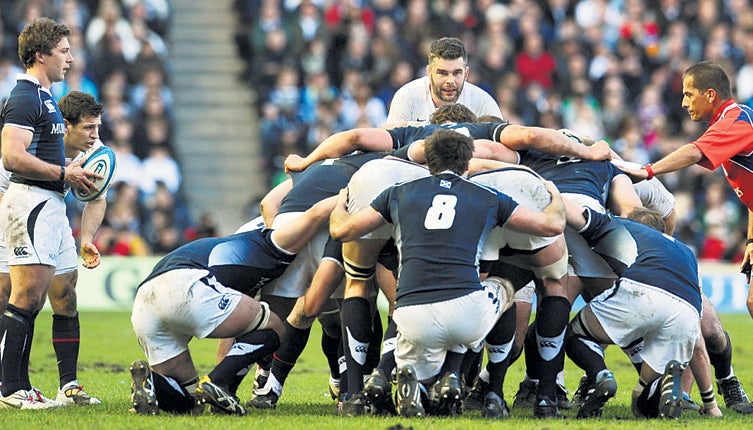Coaches sign up for Six Nations clampdown on scrum chicanery
IRB promises zero tolerance of the offences that made a mess of set pieces at last year's tournament

There was a lot of talk about scrummaging at the Six Nations gathering in London yesterday. Martin Johnson, the England manager, drew a line in the sand – a reasonable description, given the lamentable state of the Millennium Stadium pitch – ahead of next week's meeting with Wales by stating: "We're going down there to scrum. They've lost both their first-choice props, which will test their depth, and when we get to the set-pieces, we intend to push."
Andy Robinson, who coached Johnson to a World Cup winner's medal in 2003 and now coaches against him on behalf of Scotland, was equally exercised on the subject. "What we'd ask for is a fair contest," he said. "We feel we have a strong scrum, we want to use it and we want to take full value from it." Was he concerned that the set-piece might be a major source of trouble and strife during the forthcoming tournament? A characteristic narrowing of the eyes indicated that he was very concerned indeed.
And with good reason. The scrum is a mess at professional level – there have been no messier scrums in history than those that scarred the Calcutta Cup match between Scotland and England at Murrayfield a little under a year ago – and for all the efforts of the International Rugby Board, there is no obvious sign that a tidying up is underway. The new "cadence" imposed on the scrum engagement, all that "crouch, touch, pause, kiss, exchange phone numbers" nonsense, has proved a monumental waste of time. Certainly, the more hard-bitten members of the front-row fraternity have yet to bat a collective eyelid. Props still head for the deck if they lose the "hit", leaving ill-informed referees to work out who did what to whom. Invariably, they identify the wrong culprit for the wrong reason and award a penalty to the wrong team.
The IRB is deeply worried by what it regards as a major turn-off for the casual rugby viewer. The governing body released figures yesterday showing that at international level, 60 per cent of all scrums collapse and 40 per cent of them require resetting. On average, scrums take almost a minute to complete, which means around a fifth of the available playing time is often eaten up by set-piece shenanigans. Last season's Six Nations was a shocker, with 67 per cent of scrums ending up on the floor.
On Tuesday night, the coaches of the elite European teams were summoned for a "forum" on the issue. In other words, they were told their fortune by IRB representatives fearful that the two biggest broadcasting jamborees in the sport – the forthcoming Six Nations and the World Cup in September – might be comprehensively wrecked by scrummaging chicanery.
"We are encouraged that teams recognise there is a collective responsibility to ensure that the high number of collapses and resets is reduced," said Paddy O'Brien, the IRB's referee manager. "The coaches expressed their full support for referees to employ a zero-tolerance policy towards engagement offences and have given a commitment that their teams will endeavour to be compliant in producing a stable, steady scrum by binding correctly. The scrum is an integral facet of the game and by working together we can target the issues, while ensuring that player welfare continues to be the most important consideration."
O'Brien added that officials would pay greater attention to scrum-halves' activities at the set-piece and clamp down on crooked feeds, although true rugby aficionados will believe it when they see it. The New Zealander also promised a crackdown on illegal binding. According to Johnson, this was good news all round. The England scrum, he suggested, was whiter than white, and would stay that way.
"England have a scrum that stays up," he argued. "If we go forward, we go forward; if we go back, we go back. What we don't do is go down. I agree that there are too many resets, and that scrums are taking too long: at Murrayfield last year, we had a situation where a game of rugby was trying to break out between scrums. No one wants to see that. We're after a proper contest. We don't need packs baling out when things aren't going their way."
Interestingly, given the intense dissatisfaction many supporters feel at the timing of next week's opening match – Friday night fixtures may be good for television, but they are anything but for the paying public – the Six Nations administrators have decided to return to a Saturday-Sunday format in 2012 and 2013. Next year England will begin their campaign in Edinburgh and finish with a game against Ireland at Twickenham. In 2013, they will again meet the Scots first up, at home on his occasion, and travel to Wales for the final fixture.
Join our commenting forum
Join thought-provoking conversations, follow other Independent readers and see their replies
Comments
Bookmark popover
Removed from bookmarks